Reese Witherspoon: ‘Run Away From a Man Who Can’t Handle Your Ambition. Run.’
Flashback to November 2015: Reese Witherspoon stood onstage at Glamour’s Women of the Year gala at Carnegie Hall, looked up to the rafters, where hundreds of girls were sitting on the edge of their seat, and declared, “I believe ambition is not a dirty word.” Witherspoon’s powerful rallying cry struck a nerve: The room roared, and the speech went viral. One Facebook commenter put it best when she said, “I just want Reese Witherspoon sitting on my shoulder whispering ambition into my ear for the rest of my life.”
Two years later Witherspoon has doubled down on her ambition to create work that moves the needle for women. Big Little Lies, the HBO miniseries she produced and starred in, racked up 16 Emmy nominations. She’s starring in two movies, Home Again, in theaters now, and A Wrinkle in Time, out next year, both directed by women. With her production company, Pacific Standard, and new multimedia company, Hello Sunshine, Witherspoon wants to capitalize on the demand for women’s stories and tell them in every single medium: TV, film, and online.
That energy? It’s infectious—and needed right now. We asked Witherspoon to give us all another pep talk on the power of female ambition. She delivered with this heartfelt essay.
I worked for a long time on my speech for Women of the Year. At the time, I was reading a lot of articles about how people find ambition in women to be a negative trait. There was a Columbia University study that concluded that a woman with ambitious traits seemed selfish and less worthy of being hired than a man with the same traits, which made me wonder, What the heck is wrong with being ambitious? I have been ambitious all my life. In fact, I vividly remember telling my third-grade teacher that I wanted to be the first female president of the United States. Ambition is simply a drive inside of you—it’s having a curiosity or a new idea and the desire to pursue it. I asked the audience a question that night in Carnegie Hall: What if all women were encouraged to be a bit more ambitious?

Bottega Veneta dress. Carole Tanenbaum Vintage Collection earrings.
We have seen a lot of ambitious women at work since I gave that speech in 2015. It’s been exciting for me to watch women in my business secure some major wins: Watching Felicity Jones play a great female protagonist in Rogue One felt phenomenal (and the film made over $1 billion at the global box office). Patty Jenkins and Gal Gadot powered Wonder Woman to tremendous box office success—those are the kinds of movies I wanted to see as a little girl. Stories with powerful women at the center.
But to be honest, in the past two years, there have also been days when I’ve seen what’s playing out in the news for women and felt completely hopeless. I get defeated when I see news that major corporations are paying top male executives significantly more than top female executives, or that women are marching for the same rights they were marching for 45 years ago. It definitely feels backward for women to be fighting for fundamental health care. I mean…really? If our representatives value women’s health in this country as much as they claim they do, how can they even contemplate denying women access to cervical or breast cancer screenings? You can’t help our kids, our country, or our future if you don’t take care of women. That feels pretty simple to me.
But I am a glass-half-full person. I’ll tell you why.
I remember, 15 years ago, being a young actress and starting to audition for movies in L.A. There were always a lot of young women waiting in the green room for their shot at the one part there was for a girl in any given movie. Because that’s all there was—one part. As I got some of those parts, I would arrive on set to realize I was the only girl with a speaking part. There were also no women in the crew: Maybe a girl or two in the wardrobe department, but no one in any other department. I was literally surrounded by 150 men. I remember thinking it was odd that women made up half the population but such small percentages of roles in Hollywood, on and off the screen.
“Run away from a man who can’t handle your ambition. So many men think ambition is sexy.”
Fast-forward to today, and I have never been on the job with so many women, ever. Women ran the sets of the next two movies I’m appearing in. On Home Again I was lucky enough to work with Nancy Meyers—one of the most successful female writers, directors, and producers of our time, who has made some of my favorite movies, from The Intern to Something’s Gotta Give to Father of the Bride—and her daughter, Hallie Meyers-Shyer, the 30-year-old first-time filmmaker who wrote and directed the movie. I really related to the character Hallie created, a separated mother of two kids who is struggling with a central question (which is one my friends and I talk about all the time): Is this the life you’re supposed to be living? It was amazing to watch a mother-daughter creative team be in charge of every department, keeping all the trains running on time. The second film is A Wrinkle in Time, which was written by Jennifer Lee, who wrote Frozen, and directed by Ava DuVernay, who directed the award-winning films Selma and 13th.
Ava is making history as the first African American woman to direct a movie with a budget of over $100 million, and she is creating a world where an African American girl, Storm Reid, is the hero of a huge supernatural story about good versus evil. Her guides through the universe are Oprah, Mindy Kaling, and me—and we are definitely a new kind of superhero in film. Instead of punching, blasting, and shooting bad guys, we guide with wisdom and love and a healthy dose of magic. I got to go to work every day and sit for three hours in the hair and makeup trailer with Oprah and Mindy, whom I admire so much, and talk to them about everything from running a business to writing a novel to finding the perfect English muffins. Needless to say, it was a dream job.
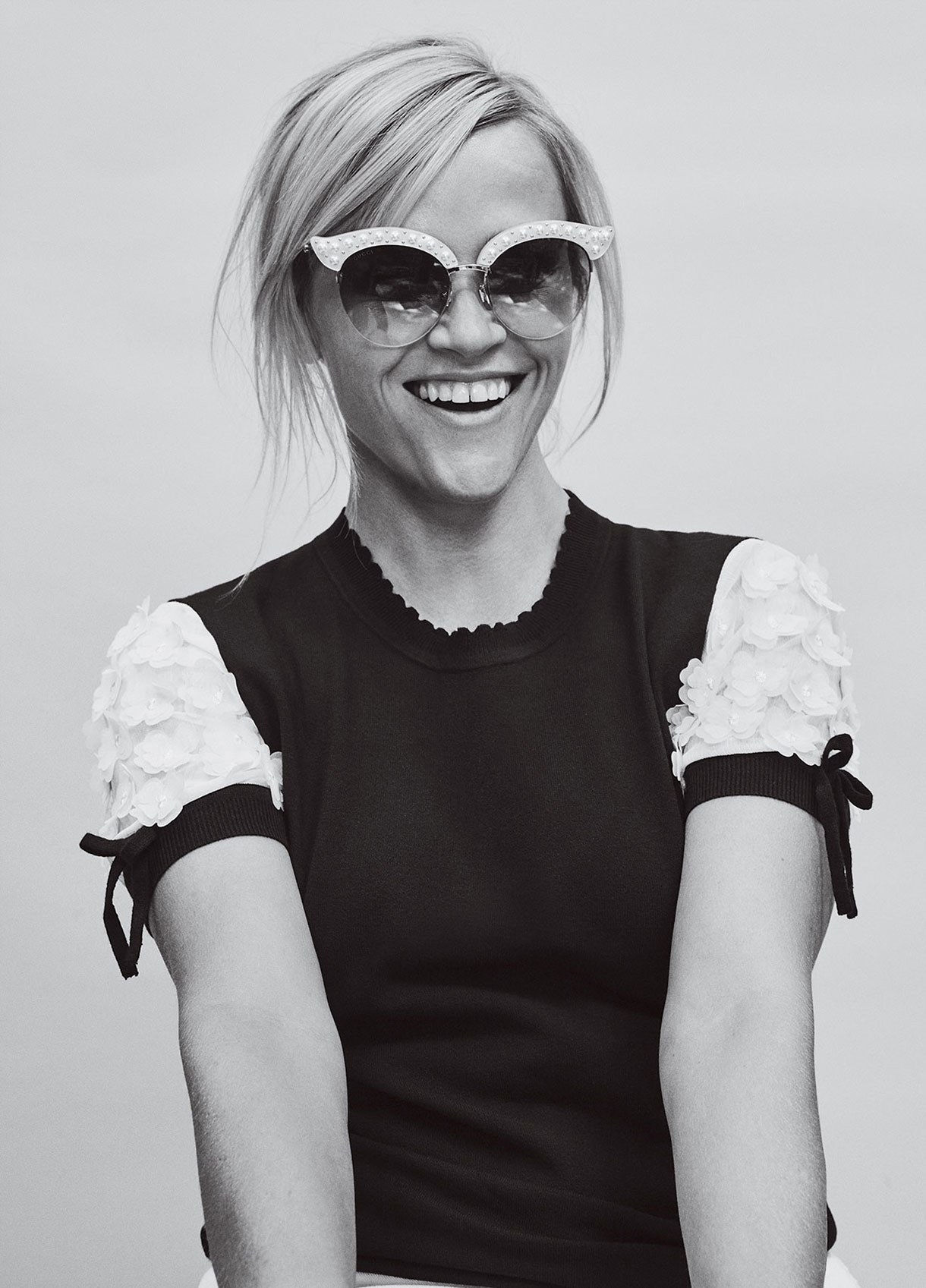
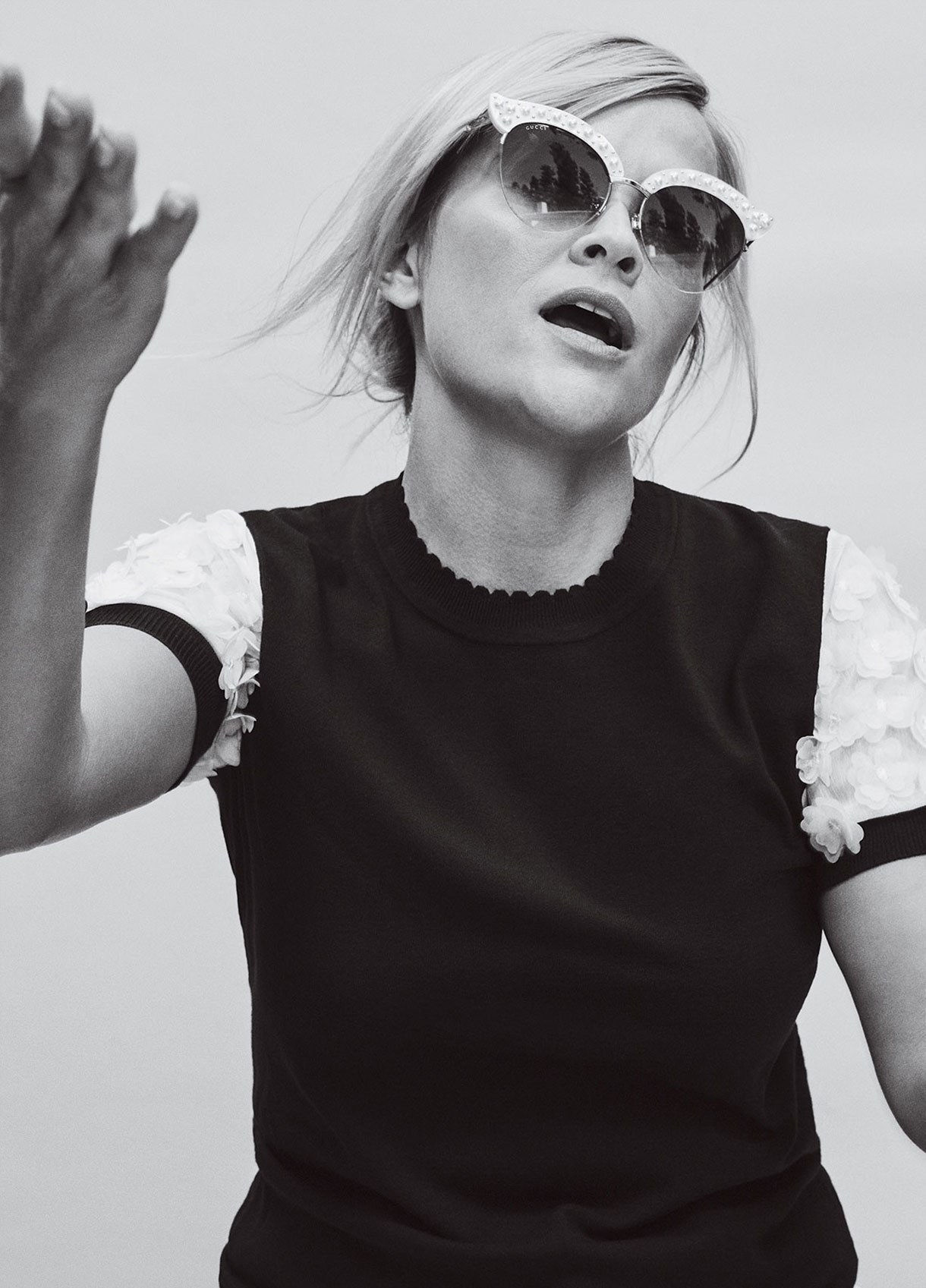
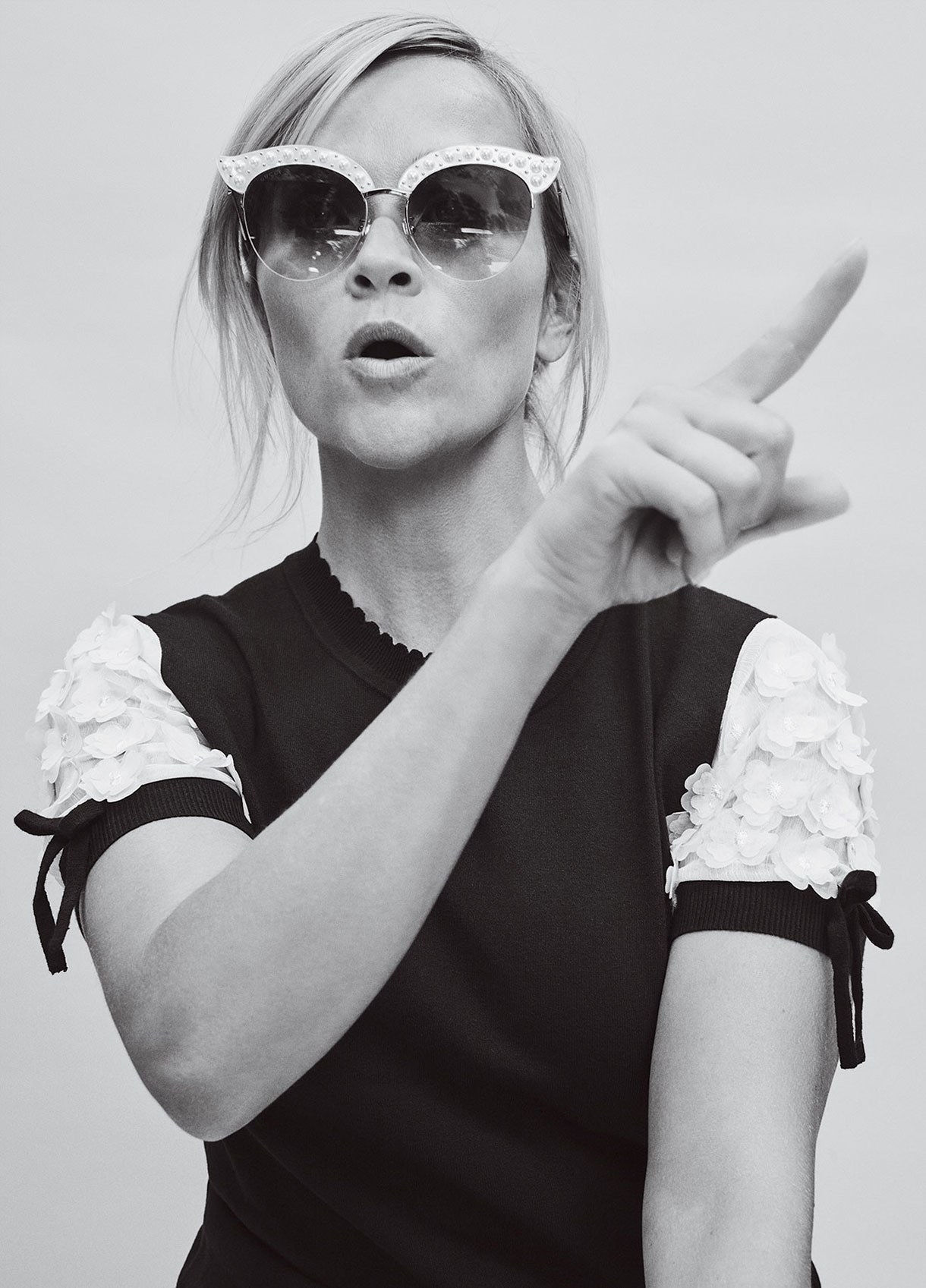
Draper James sweater. Gucci sunglasses.
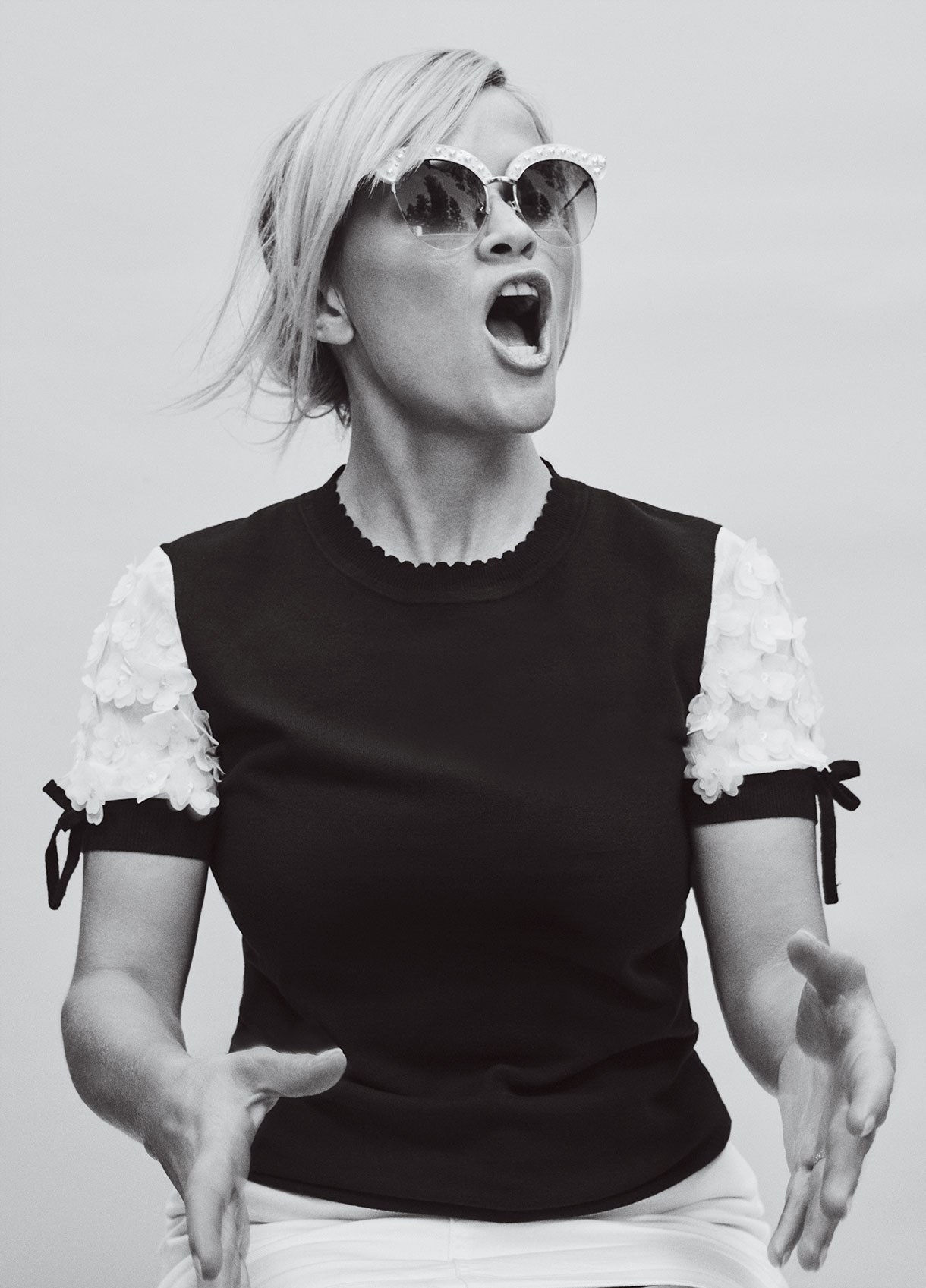
And guess what else is great? People want to see dynamic women onscreen. Big Little Lies featured five actresses who were 25 to 50 years old, and 8.5 million people on average watched each episode. We had a pretty gender-balanced audience too, proving men are interested in women’s lives. I could not be prouder of the response we got from the audience.
TV and streaming together are definitely changing the game for female roles. Today 38 percent of major characters on TV are women, which is not equal, but it’s pretty good. With the gates opening for women’s stories, you just feel like so much is going to come out of this time for women.
And I hope it does, because the film and TV business still needs to make meaningful change. Some people are realizing that projects with female leads are big-time moneymaking commodities, but I’ve also had studio heads say to me, “We don’t want to make biopics about women,” or more simply, “We’re not interested in female-driven material.” (My first go-round as a producer with Gone Girl? Every studio passed but one. When the book hit number one on the best-seller lists, it was a different story.) Women made up just 29 percent of protagonists in last year’s highest-grossing films—that’s a new high, but come on…it’s not even a third.
Another thing I think about a lot is how it feels to be a minority woman in America, so rarely seeing yourself onscreen, and it’s unconscionable. When I asked Mindy Kaling, “Don’t you ever get exhausted by always having to create your own roles?” she said, “Reese, I’ve never had anything that I didn’t create for myself.” I thought, Wow, I feel like a jerk for asking that; I used to have parts that just showed up for me. I can’t imagine how hard it is to write your own parts and simultaneously have to change people’s perceptions of what a woman of color is in today’s society.
The stakes are also much higher for stories about women. There is a lot of pressure to generate a huge profit. When any movie with a group of women starring in it doesn’t make heaps of money, the studio takeaway is that those types of films “aren’t working.” But the truth is not every movie works. It happens. If the director is a woman, she gets personally penalized too. It is definitely easier for a male director with a few flops under his belt to get another job directing; that’s not the case for women. Shouldn’t female filmmakers get as many shots as men do?

Miu Miu faux-fur coat. Wilfred Free for Aritzia bodysuit. Céline earring.
Or how about a shot, period? Women directors, writers, and producers still face considerable challenges just getting hired in the first place. Only about one in four people working in those roles in TV are women; in film it’s even worse—17 percent.
This is what I’m really trying to change.
Because here’s the deal: You can complain about these things. You can get stuck in the emotion of it—and sometimes I do, and I get really angry. I’ll get pissed off and stomp around the house. The anger comes from such a deep, real place for me. But my mother always said to me, “If you want something done, do it yourself.”
So I started a production company five years ago to create more roles for women onscreen and behind the scenes. Today I have something like 23 projects in the works driven by great female characters of different ages and races. There is a film about an astronaut, a film about the entrepreneur who invented Barbie, and a film about the young, brave American girls who were the first women to serve alongside Special Ops in 2010 in Afghanistan. I think it’s worth noting, I self-funded my production company for years. I think there’s this fallacy that because I’ve been an actor, people are going to hand me stuff. Nobody hands me anything. I’ll wake up earlier; I’ll stay up later. I will put my money where my mouth is. I have to read faster, and I respond quicker than other producers. I have to call and call and call executives until they say yes to my projects.
“I can tell that I’m considered a player [as a producer] now because of the respect I get from studio heads. They call me back quicker.”
After the presidential election I wanted to do even more: What surprised me most was how divided women felt. So many women in our country clearly did not feel seen. So I started a new multimedia company, Hello Sunshine, in order to seek out women from all over the U.S., to hear about their joys and struggles, and encourage them to be storytellers in all kinds of mediums. I want to create more opportunity on a smaller level that translates to a higher level.
All we can do to create change is work hard. That’s my advice: Just do what you do well. If you’re a producer, you’ve got to produce. If you’re a writer, you’ve got to write. If you’re in corporate America, keep working hard to bust through the glass ceiling. If you want our voices to be represented in government—and I think we’re all getting behind that idea now—encourage women to run and help them with their campaigns. If you are one of those people who has that little voice in the back of her mind saying, “Maybe I could do [fill in the blank],” don’t tell it to be quiet. Give it a little room to grow, and try to find an environment it can grow in.
Finding that environment is so important: I just had a conversation with a gal in graduate school at Stanford, and she said, “Like you, I’m small, blond, and opinionated, and it’s not received very well at my company. They don’t want to hear my opinion, but I know that I have things to offer that are additive and helpful.” And I said, “Maybe you’re not at the right company. If people don’t value those qualities, it’s time to move on.” That’s true in a relationship, at work, in a friendship. There’s no point toiling away and wasting your ambition on people who don’t value your strengths.
It also helps to have people behind you who are supportive. Anytime I feel defeated, my husband says, “Come over here, you’re the best! You’re going to do this movie, and you’re going to be great!” He gives me pep talks with a lot of sports metaphors that I don’t always understand. He says, “Did Jordan Spieth quit after he imploded on the final round at Augusta?” I’m like, “Ummm…I don’t know, did he?” And then he says, “No. When you’re great, you don’t give up. And he went on to win the British Open this year.” Then I understand! He took that experience and turned it into success. You gotta love my sports-loving husband.
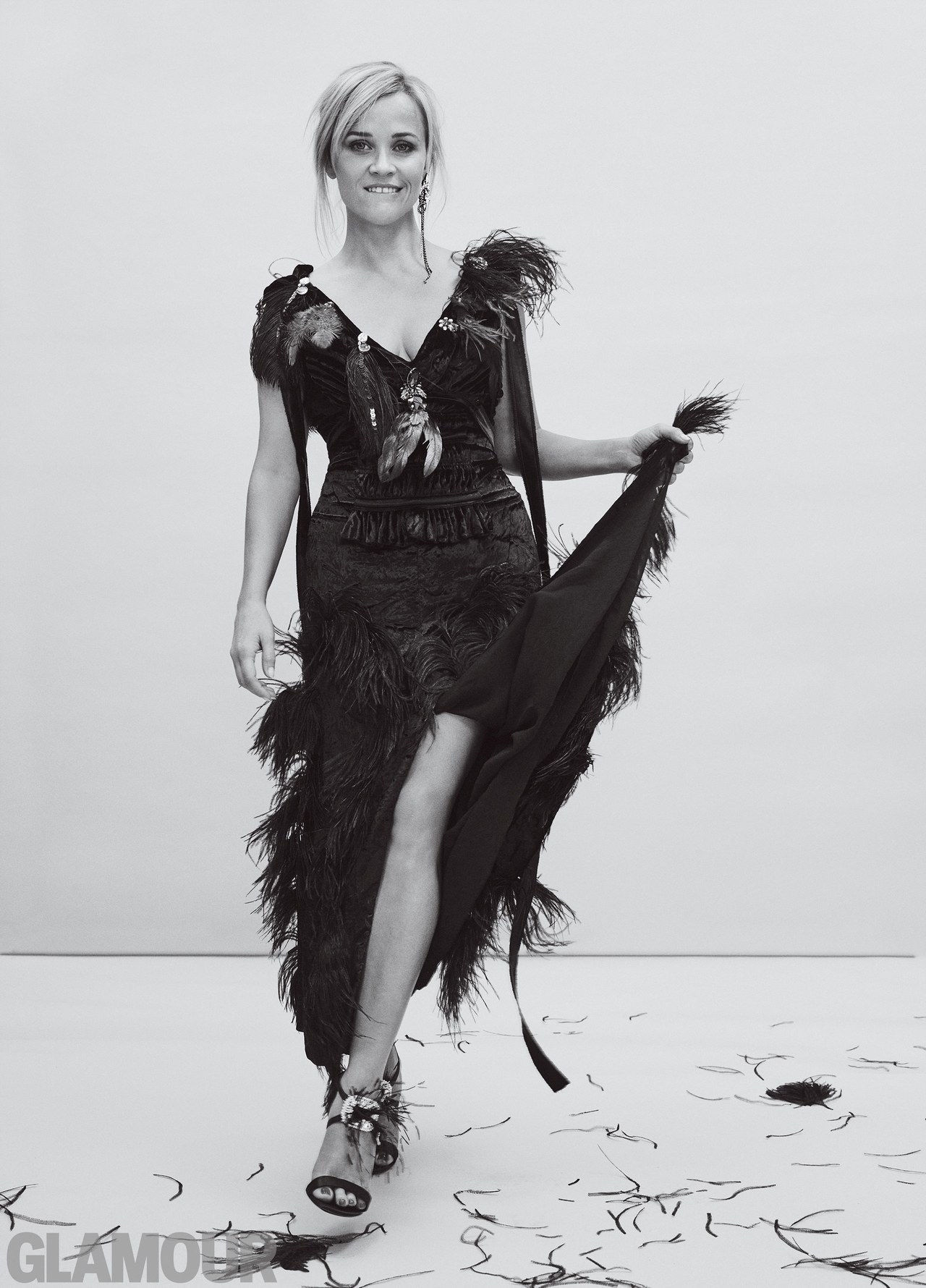
Sonia Rykiel dress. Erickson Beamon earrings. Roger Vivier heels.
When I saw the recent Harvard study that found that single female M.B.A. students downplayed their career ambitions in front of male classmates for fear of possibly hurting their marriage prospects, I thought, UGH. Run away from a man who can’t handle your ambition. Run. So many men think ambition is awesome and sexy!
My two older kids are teenagers now, and they will pull me aside and say, “I’m really proud of you, Mom.” It means a lot to me to have two kids who support my ambition to change perceptions of women. As moms, we have a unique opportunity to keep changing this attitude that ambition is an ugly quality in women. That it makes you unlikeable. What is likeable anyway? I’m allergic to that word. (Personally, I like to sit next to the most irreverent person at a party…that’s what I find likeable!) We have to do our part to change the idea that a woman with passion and ambition is out only for herself. So talk to your kids about ambition as a positive trait in men and women.
And when your ambition pays off, I encourage you to give your sisters a little goose out the door by helping to nurture their ambitions. With Big Little Lies this year, I had my third producing success. It took me three successful productions—Gone Girl, Wild, and Big Little Lies—to be considered a real player in the producer game. I can tell that I’m considered a player now because of the respect I get from studio heads. They call me back quicker and give me thoughtful responses when I pitch ideas. It has been quite a shift for me. But it makes me especially happy and proud that I’m now called by other actresses who ask, “Will you find something to produce with me?” Which is really nice. And I will because these women deserve better parts and an opportunity to reach people with their tremendous talent.
One of my girlfriends asked me the other day, “Is there anything that you wish you could change about yourself?” I thought about it, and I said, “Sometimes I wish I could turn off my ambition. Every Monday I have a new idea of what I want to accomplish, or how I want to effect change, and I get run down.” When I have those days when I’m exhausted, I go to bed early, and I find that my mission to change things is what gets me up again the next morning.
I guess it’s just who I am—that’s a whole other topic, by the way, finding out who you are, but this essay is about ambition, right?
So back to my question at Carnegie Hall…what would happen if we encouraged all women to be a little more ambitious?
I think the world would change.
Photographer: Emma Summerton
Fashion Editor: Jillian Davison
This article originally appeared in the October 2017 issue of Glamour. For more personal stories, celebrity content, and news about women who inspire us, subscribe to* Glamour *for just $5.

